#AIAndSecurity
Explore tagged Tumblr posts
Text
𝐓𝐨𝐩 10 𝐀𝐧𝐭𝐢𝐯𝐢𝐫𝐮𝐬 𝐒𝐨𝐟𝐭𝐰𝐚𝐫𝐞 𝐭𝐨 𝐂𝐨𝐧𝐬𝐢𝐝𝐞𝐫 𝐢𝐧 2025 𝐟𝐨𝐫 𝐔𝐥𝐭𝐢𝐦𝐚𝐭𝐞 𝐂𝐲𝐛𝐞𝐫𝐬𝐞𝐜𝐮𝐫𝐢𝐭𝐲
Cybersecurity isn't just an IT checkbox anymore it's a core part of operating in a digital-first, AI-powered world.
At Fraoula, where we build AI tools for smarter automation and workflow management, we know how critical it is to secure every layer of your work environment. From startup teams to scaling businesses, protecting your data, systems, and devices is foundational.
In this post, we break down the top 10 antivirus solutions to consider in 2025not just based on detection rates, but on real-world usability, zero-day protection, endpoint security, and cross-platform coverage.
If you're re-evaluating your security stack, this is the place to start.
Read the full post: https://www.fraoula.co/post/top-10-antivirus-software-to-consider-in-2025-for-ultimate-cybersecurity
#Fraoula#Cybersecurity2025#EndpointSecurity#AntivirusReview#StartupSecurity#AIandSecurity#DataProtection#WorkplaceSecurity#SaaSTools#ITOps
0 notes
Text

Keeping Sensitive Data Safe in the Age of AI
AI is powerful, but your data security should be stronger. Discover smart ways to keep sensitive information secure in the AI-driven world.
#DataSecurity#AIPrivacy#Cybersecurity#SensitiveData#AIandSecurity#AICompliance#DataProtection#ArtificialIntelligence#TechSafety
0 notes
Text
Securing Electric Vehicles: Cybersecurity for Connected Cars
The rise of Electric Vehicles (EVs) is reshaping the automotive industry, offering innovative solutions for eco-friendly transportation. However, as these vehicles become more connected, they also face growing cybersecurity challenges. Protecting connected car ecosystems from cyber threats is crucial to ensure the safety of drivers, passengers, and sensitive data. At Tech4BizSolutions, we are committed to providing cutting-edge cybersecurity strategies to safeguard electric vehicles and their intricate networks from evolving threats.

Key Cybersecurity Strategies for Electric Vehicles
As EVs integrate more connected systems, it is vital to implement robust security measures. Here are the key areas where Tech4BizSolutions is helping to secure electric vehicles:
1. Data Protection
One of the biggest concerns in connected cars is data security. EVs collect and transmit vast amounts of data, including location, driving behavior, and vehicle health. Securing this data ensures it is protected from unauthorized access or tampering.
Encryption and secure storage prevent data breaches and ensure that sensitive information remains confidential.
Secure communication channels are implemented to protect data from being intercepted during transmission between the vehicle, infrastructure, and cloud systems.
2. Threat Detection
With the growing number of connected vehicles, the attack surface for cybercriminals expands. Real-time threat detection is crucial for identifying potential risks before they can cause harm.
AI-driven cybersecurity tools continuously monitor vehicle systems, identifying abnormal patterns or behaviors that might indicate a security breach.
These tools can automatically respond to potential threats, mitigating risks before they escalate into significant problems.
3. Network Security
Electric vehicles rely on seamless communication between the vehicle, infrastructure, cloud networks, and even other vehicles. This interconnected ecosystem makes them vulnerable to cyberattacks if network security is compromised.
Firewalls and intrusion detection systems protect against unauthorized access attempts.
Secure protocols ensure that data exchanges between vehicles, charging stations, and other connected systems are safe and encrypted.
4. Software Updates
Just like any other digital system, EVs rely on software updates to enhance functionality and address security vulnerabilities. However, these updates can also be a potential attack vector if not properly secured.
Over-the-air (OTA) updates must be encrypted to ensure that only authorized software patches are applied, reducing the risk of malicious code being introduced into the vehicle.
Verification systems are crucial to ensure that software updates are legitimate and haven’t been tampered with during transmission.
Why Cybersecurity for Connected cars matters
As electric vehicles become increasingly reliant on digital systems, they are exposed to the same cybersecurity risks as any other connected device. Hackers may attempt to access sensitive data, take control of vehicle systems, or even disrupt operations, leading to significant safety and privacy concerns.
By implementing comprehensive cybersecurity strategies, manufacturers can mitigate these risks and enhance trust among consumers. Tech4BizSolutions offers expert guidance and solutions to protect connected car ecosystems from evolving cyber threats.
Tech4BizSolutions: Your Partner in EV Cybersecurity
At Tech4BizSolutions, we specialize in custom cybersecurity solutions designed to protect the unique infrastructure of connected vehicles. Our team of experts collaborates with automakers and service providers to devise strategies that tackle security risks unique to the electric vehicle (EV) sector, guaranteeing comprehensive protection for each vehicle.
We offer:
Advanced threat detection systems powered by AI.
Real-time data protection solutions for secure vehicle communications.
Secure OTA software updates to prevent cyber vulnerabilities.
End-to-end network security to safeguard connected systems.
The Road Ahead for EV Security
As the world of electric vehicles continues to evolve, so will the challenges in securing their connected ecosystems. Tech4BizSolutions is dedicated to providing the most innovative, reliable, and scalable cybersecurity solutions to safeguard EVs against potential threats. Our proactive approach ensures that automakers and consumers can trust in the safety and security of connected vehicles.
Ready to safeguard your electric vehicle systems? Contact Tech4BizSolutions today and let us help you secure your connected car network with cutting-edge cybersecurity solutions.
#Cybersecurity#Tech4BizSolutions#ElectricVehicles#ConnectedCars#EVSecurity#AutomotiveInnovation#AIandSecurity#SecureCars
0 notes
Text
AI for Peace: Opportunities for India-China Cooperation
Introduction: AI as a Tool for Diplomacy
As artificial intelligence (AI) reshapes global politics, its potential as a tool for peace and diplomacy is increasingly recognized. While much of the discourse around AI in geopolitics revolves around its application in warfare, surveillance, and competition, AI also holds the promise of fostering collaboration, conflict prevention, and enhanced diplomatic relations. In the context of India-China relations—marked by territorial disputes, geopolitical rivalry, and competition in technology—AI offers an opportunity for cooperation that could redefine their bilateral relationship and promote regional stability.
Leveraging AI for Conflict Prevention and Diplomacy
1. AI-Driven Conflict Prediction and Early Warning Systems
One of the most promising applications of AI in conflict prevention is its ability to process vast amounts of data to identify patterns that may indicate potential conflicts. AI-powered early warning systems can analyze satellite imagery, social media, and diplomatic communications to detect tensions before they escalate into full-blown conflicts. For India and China, which share a long and disputed border, such systems could be invaluable in preventing misunderstandings and unintended skirmishes along the Line of Actual Control (LAC).
Collaborating on AI-driven early warning systems could also reduce the risk of border clashes and help de-escalate tensions. By establishing a shared AI platform for monitoring border activities and real-time data sharing, India and China could foster greater transparency and trust in each other’s intentions.
2. AI in Disaster Response and Humanitarian Efforts
Another area where AI could serve as a peacebuilding tool is in disaster response and humanitarian aid. Both India and China face frequent natural disasters, and AI can help improve the coordination of disaster relief efforts. AI-powered systems can predict natural disasters such as floods, earthquakes, and storms, and optimize the allocation of resources to affected areas.
By jointly developing AI tools for disaster management, the two countries could demonstrate a commitment to regional stability and human security. Such cooperation could extend beyond their borders, with India and China leading multilateral initiatives in South Asia to improve disaster preparedness and response capabilities across the region.
3. AI for Environmental Protection and Climate Diplomacy
Environmental degradation and climate change are pressing issues that transcend borders. Both India and China are among the world’s largest carbon emitters and are vulnerable to the impacts of climate change. AI can play a significant role in addressing these challenges through data-driven solutions for reducing emissions, monitoring deforestation, and managing water resources.
A collaborative AI framework for environmental protection could see India and China sharing climate data, developing AI-based solutions to optimize energy use, and creating sustainable practices in agriculture and industry. Cooperation in this area would not only benefit both nations domestically but also bolster their global standing as responsible actors in the fight against climate change.
Proposals for a Collaborative Framework for AI Governance
Despite the growing competition between India and China in AI development, there are areas where a collaborative framework for AI governance could promote peace and shared prosperity. The following proposals outline how the two nations could work together to create a stable, transparent, and peaceful AI landscape.
1. Establish a Bilateral AI Peace and Security Council
A formal AI Peace and Security Council, jointly managed by India and China, could serve as a platform for discussing AI-driven conflict prevention, data-sharing agreements, and crisis management. This council could focus on building transparency in AI military applications, reducing the risks of accidental conflicts, and ensuring that AI developments adhere to international peace and security norms. Such a council would facilitate regular dialogue and provide a mechanism for managing AI-related tensions.
2. Joint Development of AI Ethics and Governance Standards
Both India and China have expressed interest in developing responsible AI, albeit with different priorities. India emphasizes ethical AI for social inclusion, while China seeks to balance its strategic objectives with AI safety and governance. By working together on a shared AI governance framework, the two nations could influence international standards for AI governance that prioritize peace, security, and ethical use of technology. This would also allow them to coordinate efforts in international forums like the United Nations or the International Telecommunication Union (ITU).
3. Collaboration on AI Research and Talent Exchange Programs
Academic and scientific cooperation in AI research could deepen trust and promote peaceful applications of AI. India and China could initiate joint AI research centers focused on developing AI for humanitarian, environmental, and diplomatic purposes. Talent exchange programs between their leading universities and AI institutes could foster collaboration and innovation in areas like AI ethics, cybersecurity, and sustainable development.
Conclusion: A Path Forward for AI and Peace
AI holds the potential to be more than just a tool for competition—it can be harnessed to build bridges between nations. India and China, despite their historical tensions and geopolitical rivalry, have much to gain from collaborating on AI-driven initiatives that prioritize peace, conflict prevention, and regional stability. By leveraging AI for diplomacy, disaster response, and environmental protection, both countries can showcase their commitment to peaceful coexistence and responsible AI development. The creation of a collaborative framework for AI governance would be a step toward ensuring that AI serves as a force for good in their bilateral relations and the broader global community.
#IndiaChinaRelations#AIForPeace#ArtificialIntelligence#ConflictPrevention#AIDiplomacy#DisasterResponse#ClimateDiplomacy#AIForGood#EthicalAI#AIForCooperation#AIGovernance#RegionalStability#EnvironmentalProtection#AIAndHumanitarianEfforts#GeopoliticsAndAI#PeaceThroughTechnology#AIResearchCollaboration#AIInInternationalRelations#AIAndSecurity#TechnologyForPeace
0 notes
Photo
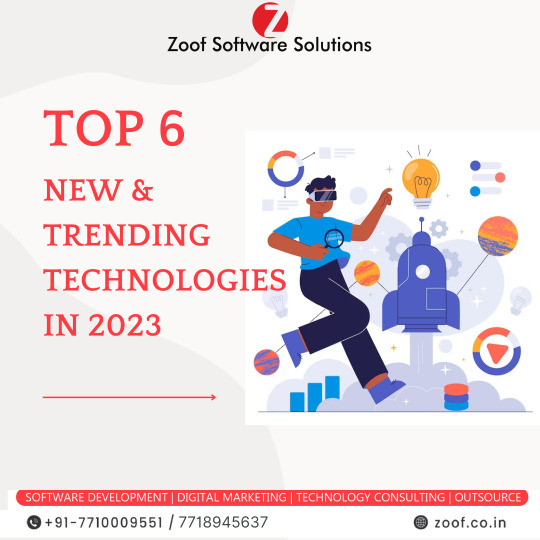
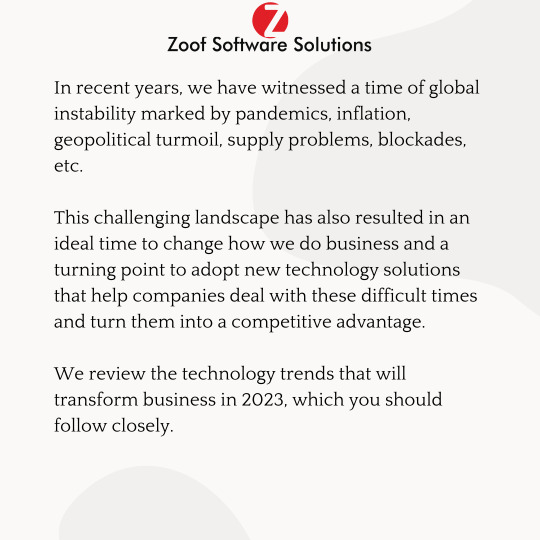
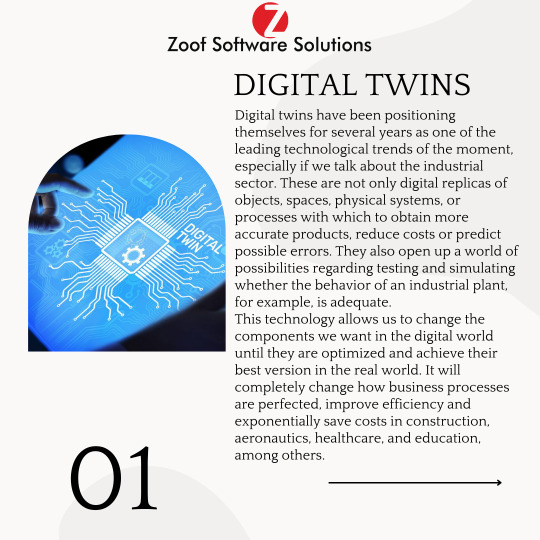

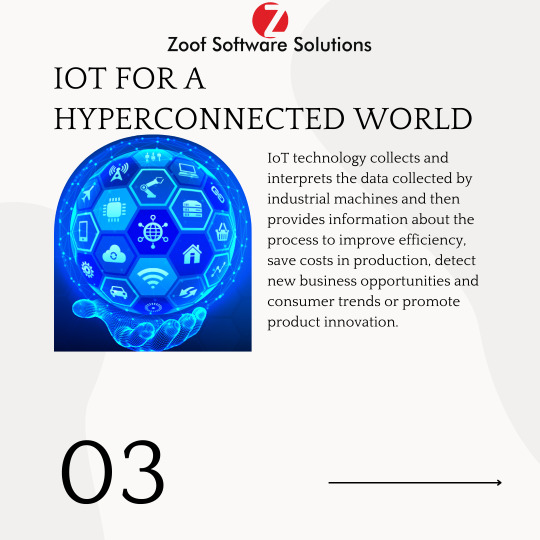
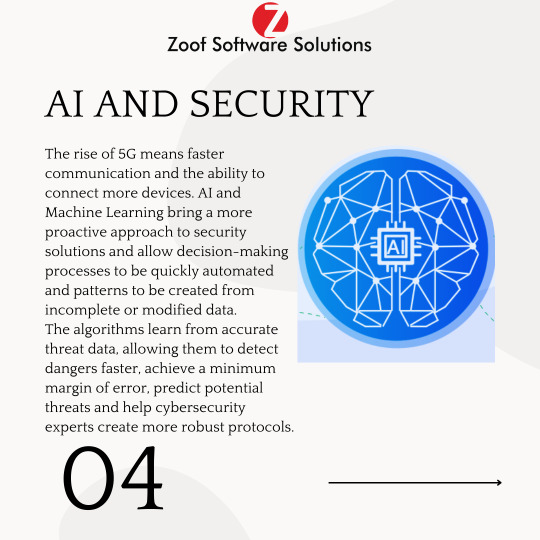

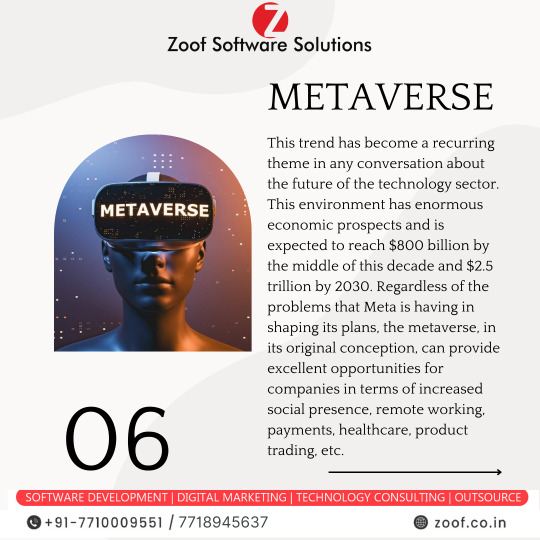
Top 10 New & Trending Technologies In 2023
In 2023, technological advancements are expected to continue to be rapid and wide-reaching. This includes the emergence of 5G connectivity, the development of quantum computing, advancements in artificial intelligence, the growth of IoT and robotics, and the use of blockchain technology. These technologies are expected to have a major impact on many industries, from automotive to healthcare, and will help to revolutionize how we interact with the world around us.
Here are the Top 10 New & Trending Technologies In 2023
1. Digital Twins
2. Blockchain To Redesign Trust
3. IOT For A Hyperconnected World
4. AI and Security
5. Quantum Computing
6. Metaverse
Swipe Left On The Post Above To See More...
Let us know if you want to know more points in the comment section below..
Do not forget to share with someone whom it is needed.
Let us know your opinion in the comment down below
Follow @Zoof Software Solutions for more information Grow your business with us!..
Feel free to ask any query at [email protected]
For more detail visit: https://zoof.co.in/
1 note
·
View note
Text
Keeping Sensitive Data Safe in the Age of AI: What You Need to Know
The rise of artificial intelligence (AI) brings unmatched efficiency, but it also opens the door to new data privacy concerns. Businesses across sectors now process vast amounts of sensitive information—from client documents to employee records—using AI tools. With this shift, data security and compliance have become non-negotiable.
To safeguard your data in an AI-driven environment:
✅ Use encrypted AI platforms: Ensure that any AI software handling data uses encryption protocols. ✅ Limit data exposure: Only share the minimum data necessary for AI processing. ✅ Conduct AI risk assessments: Regularly audit AI systems for privacy gaps. ✅ Stay compliant: Align with global standards like GDPR, HIPAA, or CCPA. ✅ Educate teams: Make cybersecurity awareness a part of your company culture.
Whether you're using AI in immigration software, HR compliance, or business automation, the focus must be on secure and ethical use of technology.
🔗 Discover AI-powered solutions that prioritize privacy
#DataSecurity#AIPrivacy#Cybersecurity#SensitiveData#AIandSecurity#AICompliance#DataProtection#ArtificialIntelligence#TechSafety
0 notes
Text
Keeping Sensitive Data Safe in the Age of AI: What You Need to Know
The rise of artificial intelligence (AI) brings unmatched efficiency, but it also opens the door to new data privacy concerns. Businesses across sectors now process vast amounts of sensitive information—from client documents to employee records—using AI tools. With this shift, data security and compliance have become non-negotiable.
To safeguard your data in an AI-driven environment:
✅ Use encrypted AI platforms: Ensure that any AI software handling data uses encryption protocols. ✅ Limit data exposure: Only share the minimum data necessary for AI processing. ✅ Conduct AI risk assessments: Regularly audit AI systems for privacy gaps. ✅ Stay compliant: Align with global standards like GDPR, HIPAA, or CCPA. ✅ Educate teams: Make cybersecurity awareness a part of your company culture.
Whether you're using AI in immigration software, HR compliance, or business automation, the focus must be on secure and ethical use of technology.
🔗 Discover AI-powered solutions that prioritize privacy
#DataSecurity#AIPrivacy#Cybersecurity#SensitiveData#AIandSecurity#AICompliance#DataProtection#ArtificialIntelligence#TechSafety
0 notes
Text

Keeping Sensitive Data Safe in the Age of AI
As artificial intelligence becomes more integrated into everyday systems, data privacy risks also increase. From biometric data to confidential client records, protecting sensitive information is now a top priority for businesses and individuals alike. Learn practical steps to stay compliant, secure, and ahead of cyber threats in the age of AI.
#DataSecurity#AIPrivacy#Cybersecurity#SensitiveData#AIandSecurity#AICompliance#DataProtection#ArtificialIntelligence#TechSafety
0 notes